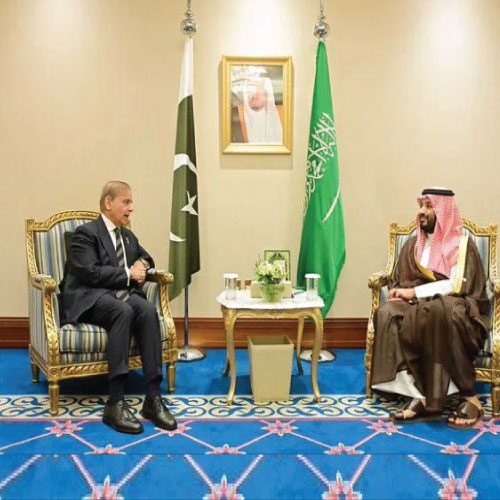The last week’s signing of a ‘Strategic Mutual Defence Agreement’ between Pakistan and the Kingdom of Saudi Arabia has prompted wide-ranging debates over its geopolitical implications.
Many nuclear pundits have equated its provision stating that ‘any aggression against either country shall be considered an aggression against both,’ with North Atlantic Treaty Organization’s (NATO) collective defence Article Five. They portrayed it as the likely projection of Pakistan extending nuclear deterrence to Saudi Arabia. While some appear to have supported any such development, reasoning that if Germany as a member of Non-Proliferation Treaty (NPT) can seek the cooperation of the United Kingdom (UK) and France for nuclear security arrangements, then Pakistan might also be obliged to extend the similar nuclear defence shield to Saudi Arabia, which is also an NPT member.
All such reasoning rests on a false analogy. Germany, France, and the UK are all members of NATO and signatories to NPT and their nuclear doctrines are not specific to any particular country. There exist traces of defence of Western Europe in their nuclear doctrines whether or not the United States’ (US) nuclear commitments waver. On the other hand, Pakistan is not a member of NPT, citing its discriminatory nature, and the country’s nuclear doctrine remains solely India-centric. Moreover, the partnership’s text has not been made public yet and the little accounts available are derived primarily from the Foreign Office (FO) statement and scattered media reports. Therefore, any conclusion drawn at this stage is likely speculative, making the comparison and prediction not only misleading but also premature.
Pakistan and Saudi Arabia have a long history of defence ties, starting from protocols of 1967 and 1982 to Pakistan Army’s former Chief General Raheel Sharif serving as the first Military Commander of the Islamic Military Counter Terrorism Coalition (IMCTC) in Riyadh since 2017.
Concerns about the nuclear dimension of the defence pact largely stem from an unknown Saudi official cited without attribution by Reuters, saying: ‘This is a comprehensive defensive agreement that encompasses all military means.’ A widely quoted remark on a Pakistani media channel by Pakistan’s Defence Minister Khawaja Asif that the country’s nuclear weapons would be available to Saudi Arabia has also provoked such speculations, a claim he later denied in an interview. Pakistan’s FO has clearly announced that the pact is not ‘directed against any third country.’
This media speculation about nuclear component of the pact has led some scholars to conclude that the development would intensify security dilemma for a few states in the Middle East, ring alarm bells over horizontal proliferation of nuclear weapons and may disturb Middle Eastern security architecture. A leading nuclear expert in Europe has taken the media to task for the premature reporting and pointed out why the accord cannot have a nuclear element in it.
Pakistan enjoys decades-old ties with Saudi Arabia – the place of Islam’s holiest sites – and takes the shared faith, strategic interests and economic interdependence as a central pillar of this relationship. Both countries have cemented ties to enhance their capacity building, trained armed forces, boost defence industrial collaboration on emerging disruptive technologies, conduct joint military exercises, and likely co-produce conventional military equipment.
The defence pact, therefore, is less about nuclear-sharing and more about Islamabad’s effort to diversify its defence partnerships following the Indian aggression it faced in May this year. India’s armed forces’ modernization, largely supported by the West, has persuaded policy makers in Pakistan to broaden its defence cooperation to maintain strategic stability in the region. In this context, Micheal Kugelman stated that the agreement would add Saudi Arabia as a new patron for Pakistan in addition to Islamabad’s traditional close reliance on China and Turkey for defence collaboration and can play a pivotal part in ‘checkmating India.’ As stated above, the pact has no nuclear string attached and Kugelman believes that it tilts the regional balance in Pakistan’s favour.
Pakistan’s former Ambassador to the US also mentioned that Pakistan’s burgeoning defence ties with Saudi Arabia can enhance Pakistan’s military muscle through economic and strategic and reverse India’s hard-won economic and diplomatic leverage in Riyadh, which it has often employed to isolate Islamabad and harm Islamabad’s national interests.
An expert in Chatham House reflected that due to Israel’s recent attacks on Qatar and other neighbouring countries, the faith in US security umbrella to the Gulf is declining tremendously. The development is incentivizing Arab states, particularly Saudi Arabia to diversify its defence partnerships than solely relying on the US for its protection.
Both Pakistan and Saudi Arabia through this pact have gained crucial diplomatic and geopolitical advantage by tying their interests together. This agreement, despite no nuclear dimension, would give Pakistan tremendous influence in addressing future military and economic challenges in the face of mounting threat from India.
Author: Mobeen Jafar Mir, Research Officer, CISS ISB

